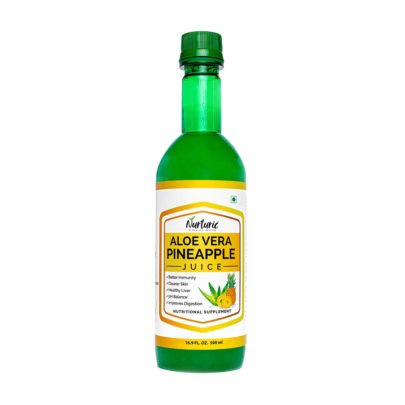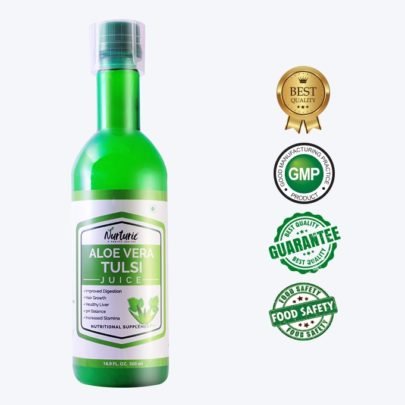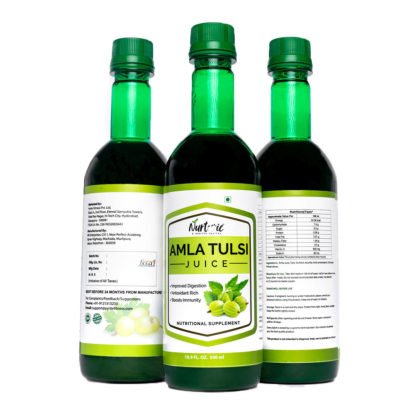- You have no items in your shopping cart
- Subtotal: ₹0.00
Monsoons are here, and the season is a welcome relief from the hot summer months. The cooler weather and rains make us happy, but it is also a time when infections are at their peak. During the monsoon season, people are more prone to disease, and it’s always best to take preventive measures to keep certain conditions at bay. Indian philosophy says that trees, plants, and all-natural elements are vital to life. Among all the oldest herbs are known to humankind, tulsi and amla’s healing and healthful properties have been the most prized worldwide.

Amla and Tulsi are two magical herbs that have gained their own identity in Ayurveda in the subcontinent. These herbs have been used to treat a variety of ailments since ancient times. Tulsi is the queen of herbs as it protects our body from bacterial and viral infections, making it the best ingredient for all ayurvedic medicines. Amla, also known as Indian gooseberry, is a natural immunity booster capable of improving overall health. Amla and tulsi is a unique concoction with numerous health benefits and eradicate disease and bereavement. Let’s dig deeper into amla and tulsi juice benefits.
10 Reasons Why You Need Amla Tulsi Mix Juice
Tulsi is an Indian plant that can be incorporated in different ways; it can be consumed in dried, fresh or powdered form or simply by chewing the leaves. It is termed the Elixir of Life because of its numerous health benefits. It has been used for more than 5000 years for its medicinal properties because it has potent anti-inflammatory, antioxidant, stimulating, and stress-relieving properties, making it the ideal choice of beverage in natural healing.

Amla has long been used as a powerful home remedy for colds and flu. It is high in vitamin C, which increases the production of white blood cells in the body, which aids in the fight against various infections and diseases. It is also high in iron, calcium, and minerals, making it a complete nutritional fruit. It is high in vitamin B5, required for fatty acid synthesis, and vitamin B6, promoting optimal nerve tissue function. It is high in antioxidants, which help the body eliminate toxins. It treats health issues caused by Vata, Kapha and Pitta imbalances. Amla and tulsi work together to treat immunodeficiency and boost the body’s immunity to fight off various illnesses and disorders. Continue reading to learn more about the 10 benefits of tulsi and amla juice.
Prevents Viral and Bacterial Infections
Amla contains various antioxidants that can help neutralise free radicals and thus protect you from a variety of diseases. It also has antibacterial properties that can aid in the detoxification of your system. The vitamin C in amla helps in boosting immunity and can treat cough and cold symptoms that often lead to chest congestion. Tulsi’s remarkable healing properties are primarily due to its essential oils and phytonutrients. Tulsi tea helps to relieve bacterial, fungal and viral infections. It has potent antibiotic, germicidal, fungicidal and disinfectant properties that effectively protects our body from bacterial, viral and fungal infections. Tulsi’s powerful properties kill all pathogens and cure the resulting fever.
Lowers Cholesterol Levels
Amla helps to keep bad cholesterol from accumulating in the arteries and promotes heart health. It contains chromium, which inhibits the absorption of cholesterol from foods, lowering cholesterol levels in the body. It also inhibits the action of an enzyme that is essential in the production of cholesterol. At the same time, tulsi has a strong influence on metabolic disorders, which significantly aids in reducing total cholesterol, triglycerides and LDL cholesterol levels.
Maintains Skin and Hair Health
Tulsi’s antioxidants aid in the formation and production of collagen, which promotes hair and skin health. The antimicrobial and anti-inflammatory properties protect the skin from radical oxidative damage caused by harmful UVA and UVB rays, delay the onset of various signs of ageing, and treat skin issues such as acne, pimples and blemishes. Its extract treats dandruff-ridden scalps, strengthens hair follicles, reduces split ends and hair fall, and promotes strong, lustrous hair. Amla’s antioxidants and vitamin C help to brighten your skin. This fruit tones and tightens the skin, making it firm and soft, and exfoliates it by removing dead cells. Amla’s high concentration of carotene, iron and antioxidants protects hair follicles and reduces the likelihood of hair loss and baldness.
Controls Diabetes
Tulsi has hypoglycemic properties and is essential in lowering blood sugar levels in the body. It aids in producing insulin from pancreatic cells and reduces the breakdown of starch into glucose, resulting in low blood glucose levels. Amla is an excellent detoxifier and eliminator of harmful toxins. It also stimulates the secretion of gastric and digestive juices, which aids in better-utilising nutrients.
Improves Heart Health
Tulsi contains ursolic acid and other phytochemicals that have powerful cardioprotective properties. The high fibre in amla strengthens heart muscles and aids in the removal of bad cholesterol from your arteries and enhances the blood flow throughout the body. It is also high in iron, which helps your body produce new red blood cells and reduces excess cholesterol plaque buildup in the vessels and arteries, lowering the risk of strokes and heart attacks. The phytochemicals in tulsi scavenge free radicals in the blood, prevent cholesterol coagulation on the blood walls and increase blood flow to all vital organs.
Boosts Respiratory Health
In Ayurvedic medicine, tulsi leaves treat breathing problems such as asthma, bronchitis, pneumonia, common cold, and cough. The active substituents in tulsi, such as eugenol and camphene, work wonders as an expectorant, helping to clear out phlegm and mucus. Drinking warm tulsi tea helps to improve respiratory health and prevents colds from worsening into severe respiratory disorders. Amla is an excellent juice for strengthening and nourishing the lungs and the entire respiratory tract, and it regulates moisture balance in the lungs.
Treats Gastric Disorders
Amla is high in fibre, which promotes regular bowel movements and can help relieve symptoms associated with irritable bowel syndrome. Amla contains vitamin C, which aids the body’s absorption of nutrients. It is also helpful in preventing hyperacidity and stomach ulcers. Tulsi leaves can help with indigestion and appetite loss and treat flatulence and bloating.
Boosts the Immune System
A robust immune system should always be a priority, and with the pandemic spreading its fangs worldwide, it is even more critical now. The easiest way to strengthen immunity is to maintain a healthy diet. A well-balanced, nutrient-dense diet is our best bet for maintaining our immune system. Tulsi has anti-bacterial and anti-fungal properties that aid in the fight against infections and disease-causing bacteria. It contains various antioxidants that kill free radicals, protect the body from disease, and boost immunity. Amla is an excellent natural immune booster high in Vitamin C, A, polyphenols, alkaloids, and flavonoids such as quercetin and kaempferol. It boosts white blood cell production, which helps the body defend itself against foreign toxins by preventing colds and allergies.
Improves the Nervous System
Amla’s antioxidants and phytonutrients can aid in memory improvement by combating free radicals that damage brain cells. Its high vitamin C content aids the body’s production of norepinephrine, a neurotransmitter known to improve brain function in people with dementia. Ocimumosides A and B are compounds found in tulsi. These compounds alleviate stress and balance the neurotransmitters serotonin and dopamine in the brain, reducing memory loss and increasing mental capacity.
Reduces Inflammation
Tulsi leaves reduce inflammation because they contain eucalyptol, which is well-known for its anti-inflammatory properties. It increases blood circulation, stimulates fluid production in the joints, and lubricates them, making them natural analgesics. Amla’s antioxidants aid in the neutralisation of free radicals and the reduction of inflammation in the body.
Now that you’ve learned about the benefits of the amla and tulsi drink, let’s talk about why you need them and what conditions they can prevent.
Who Needs It? What Conditions Can It Treat or Prevent?
Amla is used in various ayurvedic medicines and tonics to treat nausea, vomiting, giddiness, spermatorrhoea, internal body heat and menstrual disorders. In addition to being delicious, Tulsi is a nutrient powerhouse rich in antioxidants and provides numerous health benefits. The combination of amla and tulsi offers health benefits from head to toe, from the skin to other vital organs in the body. Drinking tulsi and amla juice is the simplest way to boost your energy levels while managing depression and fatigue instantly. Let us now look at the conditions it can treat.
- Immunodeficiency
- Fever
- Rheumatism
- Gout
- Jaundice
- Anaemia
- Osteoarthritis
Amla and Tulsi juice is an immune booster juice because it contains an abundance of minerals and vitamins. In addition, it’s also high in iron, calcium, and phosphorus so that it can be consumed as a whole nutritional drink.

Now that we’ve seen the advantages of the immunity booster juice and the conditions it can help prevent, let’s look at the potential side effects of amla and tulsi juice.
Possible Side Effects
Amla and tulsi juice have been used as active ingredients in many herbal medicines for centuries. It is a true homegrown superfood that is high in nutrients and has almost no side effects. However, if taken in larger doses, it can cause some side effects. Here are some of the side effects of taking it in higher doses.
- Stomach upset
- Hyperacidity
- Bloating
- Blood clotting
- Low blood sugar levels
- Higher risk of bruising
- Diarrhoea
These are some of the rare side effects that occur as a result of excessive consumption. Consult your medical advisor if you notice any of these side effects.

Now that you’ve seen the amla tulsi juice side effects associated with excessive consumption let’s talk about the nutritional facts of this immunity juice.
Nutritional Information and Ingredients – Background
Amla contains high amounts of fibre, protein, omega-3 fatty acids, manganese, potassium, copper, and B vitamins. Tulsi is high in protein, vitamin E (Alpha Tocopherol), riboflavin, niacin, fibre, and vitamins A and C. It has 0.5 mg of vitamin C, 0.02 mcg of vitamin D, 0.08 mg of iron, 4.42 mg of calcium, and 7.4 mg of potassium. When combined with the other phytochemicals, these nutrients have the potential to protect your health, reduce inflammation, and prevent many chronic diseases that can wreak havoc on your body as you age.

Now that you’ve learned about the nutritional benefits of amla and tulsi juice let’s talk about how to pick the right supplement and where to buy it.
How to Choose the Right Supplement and Where to Buy It From
Tulsi has been used for centuries for its therapeutic and medicinal properties. Amla is a nutrient-dense herb high in fibre, antioxidants, and phosphorus. Before purchasing, it is necessary to ascertain the validity of the product, whether the product is organic and whether the ingredients listed on the label are safe to consume.

If you are looking for a 100% organic and healthy supplement with no side effects, buy Nurturic Amla and Tulsi juice, which is completely safe, to reap all benefits.
Our Take
Kick start your day with tulsi and amla juice and ensure a healthy and fit self! Amla and Tulsi are nutrient-dense plants that can be used to treat common health problems. So give this juice a shot; you won’t be disappointed.
FAQ’s
What is the right time to drink amla juice?
It is recommended to consume Amla Tulsi Juice between 30 minutes and 2 hours after meals.
Does amla boost your immune system?
Yes. Amla Juice is a natural source of Vitamin C and minerals such as copper and zinc, necessary for improving your body’s immune response.
Is tulsi good for the heart?
Yes. Eugenol, a potent antioxidant found in Tulsi, is a powerful antioxidant, helps to protect the heart by controlling blood pressure and lowering cholesterol levels.
Is Tulsi good for the lungs?
Yes. It promotes respiratory health, making it especially useful for fighting colds, flu and allergies. Tulsi is great for getting rid of bad breath because it helps clear out the lungs.
What is the recommended dosage of amla and tulsi juice?
It is not recommended to drink more than 30 ml of Amla Tulsi Juice per day.
Can we eat tulsi leaves on an empty stomach?
Yes. Starting your day with 2 to 3 fresh Tulsi leaves on an empty stomach acts as a blood purifier, flushing out toxins and cleaning your internal systems.
What happens if you eat amla daily?
Amla promotes healthy glowing skin, improves vision, strengthens the immune system and regulates blood sugar and lipid levels.
Can amla regrow hair?
Yes. It promotes hair growth and improves hair quality. In addition, it cleanses the blood and improves hair colour by preventing premature greying.
Is Tulsi juice safe to drink while pregnant?
No. It is not advised for women who are trying to conceive because it may cause uterine contractions.
Does amla tulsi help in digestion?
Yes. It contains active antioxidants, which help smooth out the digestive organs and detox, stimulate, and recharge your body’s functioning.











